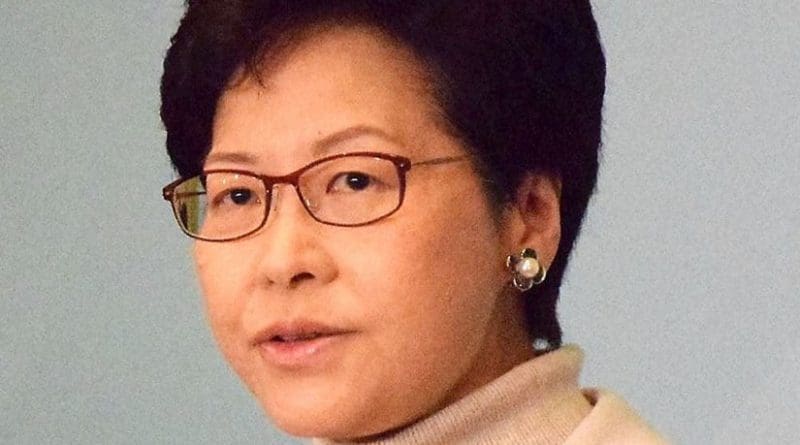Hong Kong’s 5th Wave Of COVID And Carrie Lam’s Re-Election Prospects – OpEd
Hong Kong’s public health system remains under siege as it battles the city’s fifth wave of coronavirus, with over 55,000 cases recorded on Wednesday. As a result, Chief Executive Carrie Lam has enlisted the help of the Central Government, with temporary hospitals under construction in Lok Ma Chau and Tsing Yi slated to station medical practitioners from the mainland.
Citing the deteriorating conditions of Hong Kong’s coronavirus outbreak, Lam announced the delay of the chief executive elections by several weeks until May 8th. Lam’s announcement came several days after Chinese President Xi Jinping announced that curtailing the latest outbreak would need to be an “overriding priority” of the Hong Kong government. However, despite announcing the delayed election, Lam has repeatedly avoided directly answering whether she will seek a second term as chief executive.
So far, four candidates have thrown their name into the ring, although they all lack political experience and are viewed as outsiders with little to no chance at winning the candidacy. Checkley Sin Kwok-lam was the first to announce their candidacy, a kung fu master and film producer. The remaining candidates include Titus Wu Sai-chuen, formerly a member of the Democratic Alliance for the Betterment and Progress of Hong Kong, a pro-Beijing party, Wong Man-hong, and Ahm Warm-sun. And while others such as former Chief Executive Leung Chun-ying and Financial Secretary Paul Chan Mo-po are reportedly mulling a run for the top job, no candidates with the political experience or the likely backing of the Central Government have emerged. So this begs the question: Will Carrie Lam run for re-election?
It is important to consider that the Election Committee, not universal suffrage, elects the Chief Executive. The Election Committee was recently expanded from 1,200 to 1,500 seats and is composed of elected and nominated officials. To win the nomination, candidates must receive a minimum of 188 nominations, including 15 nominations from the five committee sectors. Sweeping electoral reform laws initiated and implemented by China’s National People’s Congress in 2021 changed the ideological make-up of the Election Committee, creating a pro-Beijing majority and effectively quashing any chance of a pro-democracy candidate winning. Additionally, candidates for chief executive are now required to be vetted by the largely pro-Beijing Candidate Eligibility Review Committee, ensuring that only ‘patriots’ can run for office. The electoral reforms have all but guaranteed that a pro-Beijing candidate will win the Chief Executive election.
But divisions within the pro-Beijing bloc cannot be ruled out, and this may be playing a crucial role in Lam’s decision to have remained silent so far on her re-election bid. Plus, Beijing reportedly prefers that candidates hold out and wait to announce their candidacy until the very last moment for the same reason. After all, announcing her candidacy amidst Hong Kong’s battle against its largest coronavirus outbreak would be bad optics, especially as she has already come under fire from pro-Beijing lawmakers such as Junius Ho for her handling of the latest outbreak. Lam announcing her candidacy months before the election would also likely open the door for criticism from pro-democracy figures, international figures, and locals on several issues. Even if a candidate with a shot of winning entered the race, campaigning will likely be severely limited by Hong Kong’s Covid restrictions. It is hard to imagine Carrie Lam’s challengers gaining the momentum and support needed from the Election Committee when restrictions prevent in-person campaign events.
If Lam has decided to seek a second term, she gains very little from announcing early, mainly as no significant challengers have emerged. In fact, in Lam’s previous bid for Chief Executive, she announced her candidacy approximately two and a half months before the election, while this year’s election is already a little over two months away.
Another option on the table is further delaying the election. Lam’s term doesn’t end until June 30th and Hong Kong’s Basic Law – its de-facto constitution – provides the central government with the ability to delay the election further as long as the term doesn’t extend beyond the five-year term limit. Either way, if Lam decides to run for re-election, she is very likely to win with the backing of Beijing and without significant opposition. Time will tell what Lam has up her sleeve.
*Pieter van Wingerden is a Government major at Claremont McKenna College, focusing on Indo-Pacific security and political issues. He is particularly interested in Hong Kong politics, the development of the People’s Liberation Army, and China’s relationships with Taiwan, Hong Kong, and the United States. He was previously the Arthur A. Adams Fellow in International Strategic Studies at the Keck Center for International and Strategic Studies, where he researched and analyzed Hong Kong’s National Security Law and its impact on the “One Country, Two Systems” framework.

